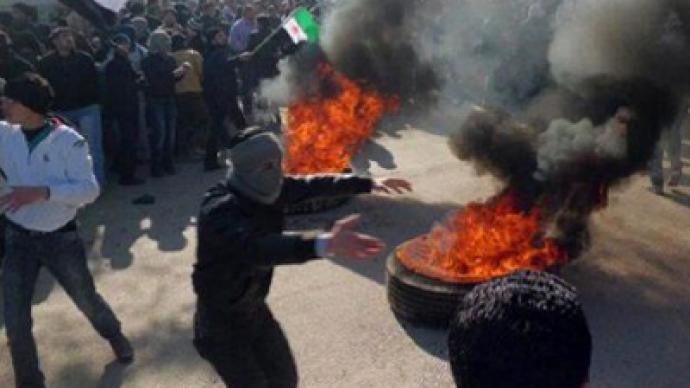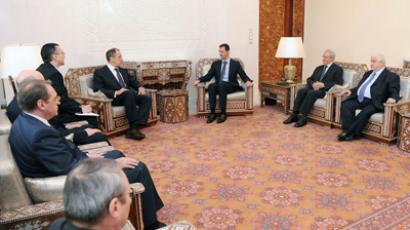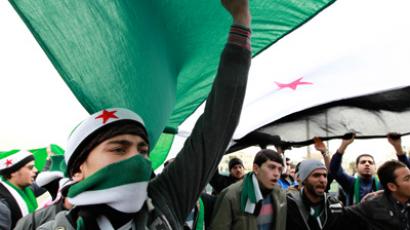Syria: War prevented

The Russo-Chinese veto in the UN Security Council effectively prevented a military operation against Syria. Writer and political scientist Igor Panarin believes France, Britain and the US have increased pressure against Moscow following the vote.
In the article below, professor Igor Panarin explains his view.
Moscow and Beijing have been absolutely reasonable in their concerns about a possible “Libya scenario” being imposed on Syria. A similar UN Security Council resolution on Libya triggered a NATO military operation in support of an armed coup in that country, which resulted in the toppling of a legitimate government. Notably, even with Muammar Gaddafi deposed and killed, there is still no stability in Libya to this day. Not to mention all the Libyan civilians killed by NATO air strikes – something the leaders in London, Paris and Washington are reluctant to admit. Sergey Lavrov commented on his meeting in Damascus on February 7 with the Syrian president Bashar al-Assad by saying his trip to Syria was well-timed and helpful. “There is every reason to believe that the message we have brought with us [to Syria] for progressing on every track has been appreciated,” Lavrov said. Kremlin has repeatedly contributed effort to refrain Syria’s civil disorder from escalating, prevent a foreign invasion, and facilitate a peaceful dialogue between Syria’s opposing political parties. Yet the Western powers, who have long pressed for a military intervention against Syria, expressed their utter resentment over the Russo-Chinese stance in the UNSC, and then reacted with outrage to the Russian officials’ visit to Damascus. An intense and comprehensive pressure campaign against Russia promptly ensued. First, on February 5, a group of people presenting themselves as Syrian opposition activists stormed the Russian embassy in Tripoli, Libya. It is no secret that NATO spec op troops spearheaded the capture of Tripoli by rebel forces in the summer of 2011, and that the present Libyan government is under control of the West. Moreover, the reported “hundreds of Syrian activists” would have no particular reason or opportunity for being in Libya. Which means that the assault against the Russian diplomatic mission was a special operation pulled off by Western secret services. It is very reminiscent of the “stray” missile that hit the Chinese embassy in Belgrade during the NATO bombing campaign against Yugoslavia in 1999. The assault on the embassy is a blatant offense against Russia’s national security, which must be retaliated for adequately. Secondly, US Ambassador to the United Nations Susan Rice persistently refers to the “atrocities” allegedly committed by the Assad regime. No sound evidence of such atrocities has been presented so far, which reminds us of former US Secretary of State Colin Powell’s case against Saddam Hussein in 2003 and the alleged weapons of mass destruction, which were eventually never discovered in Iraq. Thirdly, caving to American pressure, Spain, Italy, Germany, France and Britain recalled their ambassadors from Syria within three days. The US has shut down its embassy in Damascus and evacuated its staff. On February 7, Saudi Arabia, United Arab Emirates, Bahrain, Kuwait, Oman and Qatar similarly withdrew their ambassadors from Damascus. All six of these Arab nations are members of the Gulf Cooperation Council. Fourthly, the French Foreign Ministry announced on February 8 that President Assad had already violated his commitments negotiated with Lavrov and Fradkov on February 7. Later the same day, the French arranged a phone conversation between Nicolas Sarkozy and Dmitry Medvedev. As the French leader insisted on forcing al-Assad to resign as soon as possible, the Russian president cautioned him against hasty measures. Fifthly, a number of Arab media outlets circulated a falsified report on February 8 alleging that Russia’s UN Ambassador Vitaly Churkin had threatened the persistent foreign minister of Qatar with “obliterating” his country. The Russian diplomat subsequently refuted the allegation at a UN-hosted press conference, suggesting that somebody is deliberately trying to put Russia at odds with the Arab world. Sixthly, the media campaign against Syria has been drastically stepped up, with practically every big-name international network joining the firing squad: the BBC, CNN, Euronews, Al Jazeera, Al Arabiya, etc.Russia wholeheartedly supports a political settlement for Syria and intends to continue its diplomatic efforts involving Damascus, Syria’s neighboring countries and Arab League member states. Apparently, the NATO heavyweights are interested in a different scenario for Syria – hence the amplified pressure on Russia. NATO’s ultimate objective is most likely turning Syria into another Iraq: a quagmire of ethnic and sectarian violence, locked in endless terrorist warfare among feuding communities. Similarly to Iraq, Syria is also a patchwork nation with its own Sunni, Shia and Christian communities. The chaos that is very likely to follow an illegitimate deposition of the Assad government may claim hundreds of thousands of civilian lives. For reference, some 700,000 civilians have perished in the war-torn Iraq since its “liberation” by the US-led coalition, with some 5 million refugees fleeing the country. Syria’s population is roughly equal to that of Iraq: 24 million. All these people are now hostages to a military gamble orchestrated by the same powers that have turned Iraq into a perpetual war zone. It would be next to impossible for Syria to survive such a massive instigation campaign without help from friendly nations. In turn, Syria is also Russia’s last stand: the recent assault against the Russian embassy in Tripoli has demonstrated that Russia could also be on NATO's list of potential targets. Syria is Russia’s strategic ally, who could assist Russia in restoring its military presence in the Mediterranean. There are also considerable economic interests concerning Russian arms and hardware sales to Syria. One important transaction of late has been the shipment of several Yak-130 lead-in fighter-trainers to Syria in January 2012, especially considering the timing of the deal. A further spread of war and chaos in the Middle East would put Russia’s national security at risk, making its southern frontiers more vulnerable to infiltration by terrorists and insurgents. That is why, along with rendering support to Syria through diplomatic, political and press-coverage means, Russia should also consider forming a Special Operations Corps to secure its national interest through preventive action in the Middle East.
Prof. Igor Panarin, Doctor of Political Sciences, special to RT
The statements, views and opinions expressed in this article are those of the author and do not necessarily represent those of RT.














